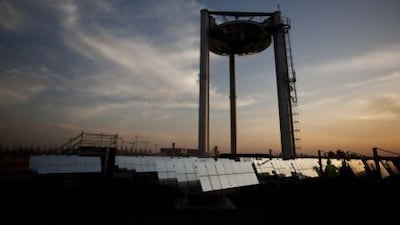Masdar and the International Finance Corporation have penned an agreement that could see the World Bank subsidiary provide as much as US$1.5 billion in financing to the Abu Dhabi investor for clean energy projects around the world.
In a memorandum of understanding (MoU) announced yesterday and signed in Washington DC, the IFC and Masdar agreed to look at projects ranging from solar plants to carbon capture and storage facilities.
"We look forward to working with the International Finance Corporation to advance renewable energy and novel cleantech projects wherever they have the greatest social, environmental and economic impact," said Sultan Al Jaber, the chief executive of Masdar, Abu Dhabi's clean energy company.
A for-profit division of the World Bank, the IFC invests in private sector projects in developing countries, with the aim of fostering sustainable development.
"Scaling up low-carbon, renewable power and solar desalination projects in developing countries provides sustainable access to energy and boosts economic growth. This agreement will help support that work," said Jin-Yong Cai, the chief executive of the IFC.
Masdar is responsible for meeting Abu Dhabi's target of sourcing 7 per cent of its electricity from renewable energy by 2020, and in March inaugurated the region's largest solar array, the 100MW Shams-1 plant in Madinat Zayed.
It is also active abroad, with solar projects in several countries, and a minority stake in the world's largest offshore windfarm, the London Array in the United Kingdom.
Increasingly, Masdar is gaining experience in building and operating renewable energy projects. It also has a presence in the developing world - its latest project is a 15MW solar plant in Mauritania funded by the Abu Dhabi Government.
The IFC investment could span the entire scale of Masdar's ambitions. The company last year agreed with the Abu Dhabi National Oil Company (Adnoc) to move ahead with projects to capture emissions and inject them into an oilfield to boost production.
Shams-1 is the first of a string of solar projects that Masdar will develop in Abu Dhabi, and the company is keen to expand its renewables footprint throughout the region.
Several countries in the Middle East have announced plans to derive a significant amount of energy from renewable sources. Solar and wind projects will be developed by private players, who make their money from the tariffs they receive for their electricity.
The IFC is also considering whether to partner Masdar in venture capital and private equity funds. The Abu Dhabi company has established two investment funds, and still has money left in one of these funds to invest. Joint investments with the IFC are unlikely until both funds are fully committed, the company said.
Countries throughout the African continent are looking to renewable energy as an alternative to scarce hydrocarbon resources. Desertec, an interest group of European companies, banks and politicians, is promoting the idea of exports of solar power from North Africa. In Morocco, the first large-scale solar arrays are already under construction.
In the Arabian Gulf, Saudi Arabia in particular has been making headlines with plans to generate 41GW from solar plants by 2032.
Last year, $268bn was invested in renewable energy worldwide, according to Masdar's statement. That figure is expected to reach an estimated $750bn annually by 2030, accounting for 73 per cent of total annual investment in power generation, it said.

